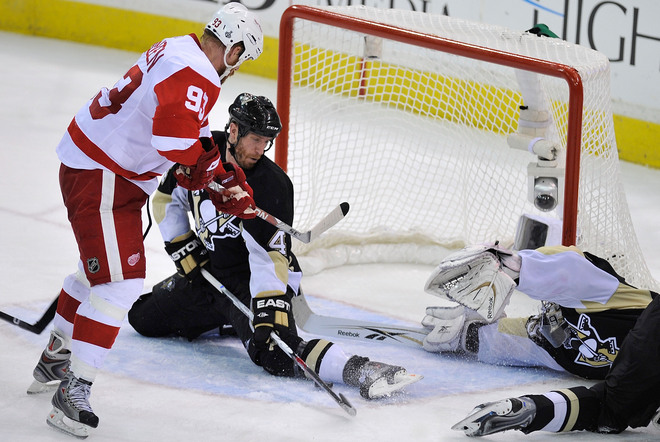
Minor League Fan, Big League Rollercoaster
By: Ali Myers
When I first got into hockey in 2001, it wasn’t by watching an NHL game on TV. It was by attending a minor league game in my hometown. After two games, I couldn’t get enough of it. Several years later, I have a hockey jersey collection, season tickets, and have traveled near and far to support my team on the road.
My team, in case you are just joining me here on Pens Universe, is the Wilkes-Barre/Scranton Penguins. I am an American Hockey League fan. Yes I love Pittsburgh, but the “Baby Penguins” are my number one team. I am proud of them and will stand behind them no matter what happens; even as I criticize them after a loss. A lot of my energy is devoted to going to their games, monitoring box scores and supporting the revolving door of players.
Considering that many AHL teams get healthy attendance and have several loyal fans, I am not pretending I am anything special. However, I do believe that being an AHL fan is more of a rollercoaster ride than supporting an NHL team.
Being an AHL fan definitely has a positive aspect. The 29 teams are mostly located in small to medium sized cities such as Wilkes-Barre/Scranton, Hershey, Pennsylvania; and Portland, Maine. Because the teams are in smaller markets, there is a sense of community among the fanbase. When you go to games regularly, you get to know many people who are at just as many games as you are. Thanks to hockey, I have met a lot of great people; some of whom I have close friendships with. I would not have these relationships if not for the Baby Penguins.
Another benefit is the interaction you get with the players. AHL teams usually don’t have a Sidney Crosby or Alex Ovechkin who you cannot get an autograph from unless you have big bucks or are willing to fight throngs of fans and media outside arenas. Many teams have season ticket holder meet and greets, holiday parties, and end of season banquets where fans can get up close and personal with the players. I am not saying NHL teams do not do these things. However, there is usually not as much hype surrounding an AHL team, and thus, the players are more accessible to fans. It is great to get a player’s autograph or a photo with them so if they make it to the NHL, you can say “I knew him when…”
The biggest downside of rooting for an AHL team is the NHL affiliation. It’s not that the NHL affiliations do a poor job, but sometimes, it is hard to remember that the AHL exists to develop players for the NHL and to call them up as needed due to injury to the NHL players. Here in Wilkes-Barre for instance, nine different players have seen time with Pittsburgh this season. The call ups have partially caused the team to go into losing skids and have a hard time developing chemistry.
Whenever I see that a WBS player has gone to Pittsburgh, I feel torn. I am very happy the player is fulfilling his dream; but at the same time, I think of how much we need him back here and hope he can come back soon. Luckily, none of the Pittsburgh callups this season have been permanent.
Aside from the callups, it can be difficult to be a fan of a developmental team if you are more interested in having a winning team than watching prospects develop. Both types of groups exist among WBS fans. This season we have a lot of rookies and there are several fans that do not care about the team’s record; only how the prospects look over the course of the season. However, I and several others see winning as more important. We want the most talented players possible and don’t want to watch games with low offensive output, mediocre defense, and sit through a season where the team has to play catch up to earn a playoff spot.
That’s not to say I don’t want prospects to better themselves and make the NHL. My opinion is that when I am paying good money for tickets (WBS does not have cheap tickets and increases prices every year, but that’s another rant), I do not want to see a team spend almost a whole season “learning”. I prefer to have an excellent record, see players earn individual honors, and stand a good chance at winning a championship. However, some AHL teams such as Hershey, Manitoba, and Chicago do value winning and sign the players that give them the best chance of winning the Calder Cup; not necessarily the prospects that will become future NHL stars.
I will always love my team, regardless of what direction they take. However, I still want them to be the best they can be; and if that means I talk more about wins and losses rather than how a prospect looks from one night to the next, then so be it. The developmental system may help NHL clubs, but without hundreds of thousands of fans in 29 different cities, this system would not exist.
So if you’re an AHL fan who is reading this, it is OK to dream of the day your team lifts the Calder Cup. It’s OK to want your players back from the NHL as soon as possible. Just realize the ride to great things will be unpredictable and not always smooth.



 Sunday, January 31, 2010
Sunday, January 31, 2010
 Damian Romano
Damian Romano
















































 WBS coaches John Hynes (front left) and Todd Reirden go back to the locker room at the end of the first period.
WBS coaches John Hynes (front left) and Todd Reirden go back to the locker room at the end of the first period.
